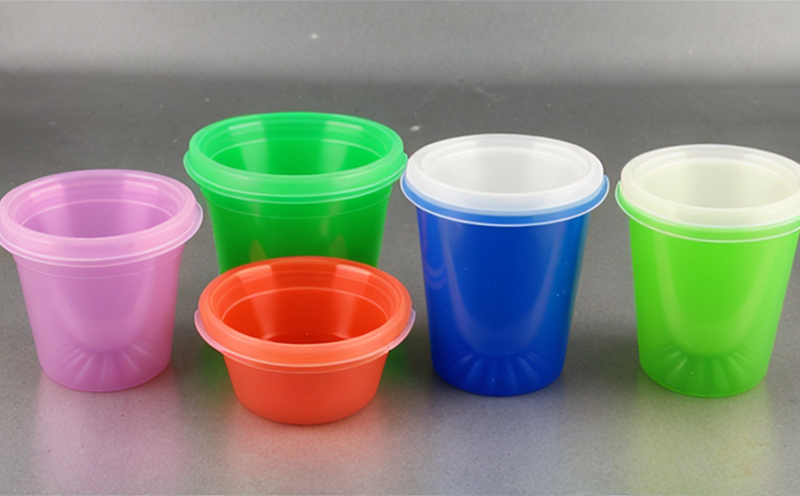BS EN ISO 178 Flexural Properties Testing of Disposable Plastics
The testing of flexural properties as per BS EN ISO 178 is a critical procedure for ensuring the quality and safety of disposable plastics. This standard provides a framework to measure how well plastic materials can resist bending stresses without breaking. The flexural modulus, which measures stiffness, and the flexural strength, which measures resistance to fracture, are two key properties assessed under this method.
Disposable plastics are widely used across various sectors including healthcare, food packaging, consumer products, and industrial applications. Ensuring that these materials meet stringent standards is not only important for maintaining product quality but also for regulatory compliance. This testing ensures that the plastic components of disposable products will perform reliably throughout their intended life cycle.
The process involves several steps: first, the specimen must be prepared according to the standard's specifications. Typically, specimens are cut into rectangular shapes with specific dimensions and tolerances. Once prepared, they are mounted in a test machine designed for flexural testing. The specimen is subjected to gradually increasing bending stress until it either cracks or breaks.
The results of this test provide valuable information about the mechanical properties of the plastic material, helping manufacturers optimize their formulations. For instance, understanding how flexible certain plastics need to be can influence design decisions in medical devices like syringes or surgical gloves. Similarly, knowing the breaking point helps ensure that packaging materials are robust enough to protect products during shipping and handling.
Moreover, this testing is crucial for compliance with international standards such as BS EN ISO 178. Compliance ensures that products meet specific quality requirements set by governing bodies worldwide, thereby protecting consumers from potentially harmful or substandard items. By adhering strictly to these guidelines, laboratories like Eurolab can provide reliable test results that are accepted globally.
Understanding the nuances of flexural testing allows us to appreciate its significance in ensuring product integrity and safety. It is a fundamental aspect of materials science and engineering, playing an integral role in developing new products while maintaining established standards.
Why It Matters
The importance of flexural properties testing cannot be overstated when dealing with disposable plastics. These tests are essential for several reasons:
- To ensure that the material can withstand bending stresses without breaking, which is crucial for products like medical gloves or food containers.
- To provide a consistent and reproducible method of assessing plastic quality across different batches and manufacturing processes.
- To comply with international standards such as BS EN ISO 178, ensuring global acceptance and regulatory compliance.
Flexural testing helps manufacturers optimize their production processes by identifying optimal material properties. This not only enhances product performance but also reduces waste and costs associated with rework or scrap materials that do not meet quality standards.
From a broader perspective, accurate flexural property measurements contribute significantly to public health and safety by ensuring that disposable plastics are safe for use in various applications. By adhering to stringent testing protocols like BS EN ISO 178, laboratories can help prevent incidents where defective materials could pose risks to end users.
Furthermore, the results of these tests play a vital role in product development cycles. They inform design decisions and guide improvements aimed at enhancing both functionality and durability while maintaining cost-effectiveness.
Benefits
- Enhanced Product Quality: Rigorous testing ensures that all manufactured items meet the specified performance criteria, thereby improving overall product quality.
- Improved Safety: By ensuring that materials are robust enough to withstand expected usage conditions, flexural tests contribute to increased user safety.
- Regulatory Compliance: Adherence to international standards like BS EN ISO 178 helps companies avoid penalties and sanctions related to non-compliance.
- Cost Efficiency: Early detection of issues through testing can prevent costly rework or scrap, ultimately leading to more efficient production processes.
In addition to these tangible benefits, flexural property testing fosters innovation by providing insights into material behavior under stress. This knowledge allows researchers and engineers to develop novel materials with improved mechanical characteristics, opening up new possibilities for product design and development.
Eurolab Advantages
At Eurolab, we bring decades of experience in conducting comprehensive polymer and plastics testing. Our state-of-the-art facilities equipped with advanced instrumentation ensure accurate and reliable results every time.
- Expertise: Our team comprises highly skilled professionals who possess deep knowledge of international standards including BS EN ISO 178.
- Accreditation: Eurolab is accredited to conduct tests according to BS EN ISO 178, guaranteeing the highest level of credibility and accuracy.
- Precision: We use sophisticated equipment that can provide precise measurements essential for accurate interpretation of test results.
- Comprehensive Reporting: Our reports are detailed and informative, providing clients with all necessary data to make informed decisions about their products.
We pride ourselves on delivering not just tests but also valuable insights into our findings. This holistic approach ensures that our clients receive the full benefit of our expertise in polymer & plastics testing.





